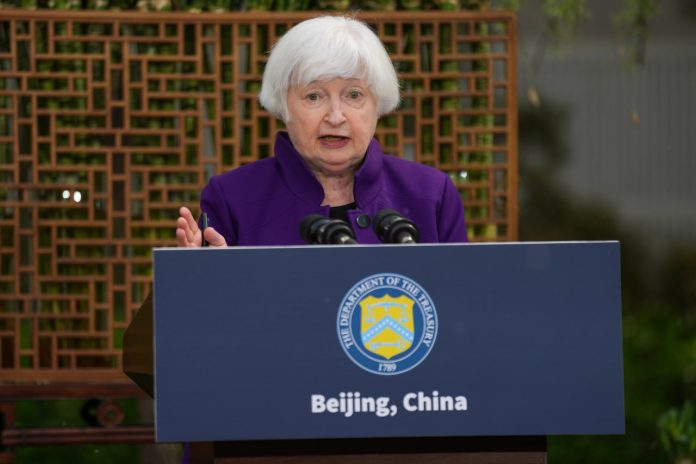BEIJING — U.S. Treasury Secretary Janet Yellen said Monday that future discussions between the U.S. and China will focus on Beijing’s need to change its policy on industry and the economy.
“We intend to underscore the need for a shift in policy during these talks — building on the over two hours I spent on this topic with the Vice Premier last week,” she said in prepared remarks for a news conference Monday, as she wrapped up the fourth and final full day of her trip to China.
She arrived in Guangzhou on Thursday and is set to depart Beijing on Tuesday.
Yellen said her conversations with Chinese officials during the trip discussed plans Beijing had for its economy, but she did not elaborate.
Yellen also declined to share what tools the U.S. might use to prevent China’s industrial policy from resulting in the loss of American jobs.
She noted U.S. conversations with the Chinese would continue later this month at the International Monetary Fund and World Bank Group spring meetings in Washington, D.C.
China’s industrial overcapacity — or excess production of goods that undercuts global competitors on price — has increasingly become a point of international concern. Other countries claim such production is often heavily subsidized.
China’s commerce minister said during a trip to Europe that accusations of “overcapacity” are “groundless” and that innovation, not subsidies, drove China’s EV industry.
In contrast to other countries’ focus on the impact of Chinese overcapacity on global trade, Beijing’s oversupply concerns tend to focus on the deflationary aspects, detriments to banking sector health and local governments’ fiscal stress, said Yue Su, principal economist for China at The Economist Intelligence Unit.
“We anticipate further anti-subsidy and anti-dumping investigations on Chinese manufacturing to take place throughout the remainder of the year, particularly as inflation becomes less of a concern for many developed economies,” Su said. “These investigations may extend to Chinese overseas factories, including those in ASEAN countries.” Source: CNBC






















